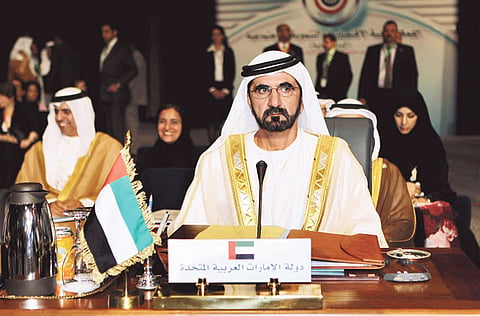Progress antidote to Arab anger: Amr Mousa
Summit addresses problems across Arab world in the wake of the Tunisian upheaval

Sharm Al Shaikh: The Arab League chief warned the region's leaders on Wednesday to heed economic and political problems that sparked Tunisia's upheaval because Arab citizens' anger had reached an unprecedented level.
Widespread public protests in Tunisia — prompted by high prices, a lack of jobs and political repression — toppled the country's president of 23 years, Zine Al Abidine Bin Ali.
Arab populations across the Middle East and North Africa complain about the same issues that beset Tunisia and have been encouraged by TV images of the president being flung from office by street action — events not seen in the region for decades. "What is happening in Tunisia in terms of the revolution is not an issue far from the issues of this summit, which is economic and social development," Amr Mousa told the Arab Economic Summit.
"The Arab citizen has entered a stage of anger that is unprecedented. I am certain that achieving full development that is tangible to the Arab citizens will relieve our societies of these challenges," he said.
Not an isolated case
Arab officials have played down the prospects that events in Tunisia could spread. Egypt's president Hosni Mubarak did not directly mention Tunisia in his speech although he broadly called for economic development. Kuwait's emir Shaikh Sabah Al Ahmad Al Sabah called for national unity in Tunisia.
Mousa, who has a habit of making blunt assertions, said shortly before the summit that Tunisia should not be seen as an isolated case and a lesson should be learned. "It is on everyone's mind that the Arab self is broken by poverty, unemployment and a general slide in indicators," he said in yesterday's speech, referring to Tunisian events as an example of "big social shocks" facing many Arab societies. "This is in addition to political problems that have not been resolved," he said, adding that poor management of such issues was further complicating the situation.
Analysts say events in Tunisia have unsettled the world of entrenched Arab rulers and their image of governments with military backing that are immune to local discontent.
They also say the Tunisian protests, which were not driven by Islamic slogans, throws into question the argument propounded by Arab rulers that they are the bulwark against Islamist radicals sweeping to power.
UAE calls for unity
The Arab, Muslim Jerusalem can never be surrendered as history, law and international legitimacy confirm Muslims' inalienable rights to it, irrespective of the Israeli occupation's measures to increase Jewish presence there, said President His Highness Shaikh Khalifa Bin Zayed Al Nahyan.
In his speech at the meeting of Inter-parliamentary Union of the Organisation of Islamic Conference (OIC) read out by His Highness Shaikh Saud Bin Saqr Al Qasimi, Supreme Council Member and Ruler of Ras Al Khaimah, Shaikh Khalifa said it was essential for Muslim parliamentarians to improve parliamentary systems and institutional performance to defend Islamic rights.
"Any foreign intervention in the Muslim world's affairs will jeopardise national harmony and Muslims' aspirations for cohesion," Shaikh Khalifa warned, saying that protecting the rights of Christians and peace in Sudan are vital issues.
The UAE called upon the OIC to urge governments of 51 Muslim nations to invite a meeting of the UN General Assembly on implementing resolutions on Occupied Jerusalem, and demand that Israel withdraw from Occupied Jerusalem and the occupied Palestinian territories. The UAE also pressed for taking firm stands towards countries which move their embassies to Occupied Jerusalem.
— By Samir Salama, Associate Editor



